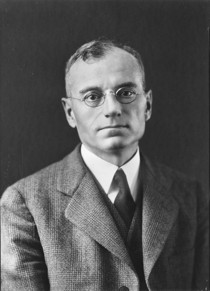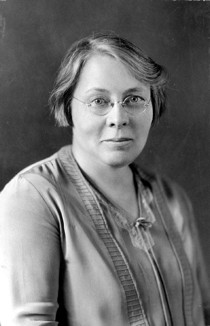FACULTY
Faculty Legends: Carl Becker & Ethel Waring

Carl Becker. Photo: Division of Rare and Manuscript Collections. See larger image
Carl L. Becker (1873-1945; on Cornell's faculty 1917-41) was a professor of American and European history. A low-key Midwesterner, Becker was particularly beloved by graduate students. He was a prolific writer, widely known for his essays, and was influential at every level – from the highest echelons of the academy to secondary-school classrooms.
He captured the spirit of the university with a phrase and concept that has become a Cornell trademark: "Freedom and responsibility."
Becker is remembered for the impact he had as a teacher, his eminence as a scholar and for his distinguished service to the university in his role as university historian (1941-45).
Michael Kammen, the Newton C. Farr Professor Emeritus of American History and Culture (who died Nov. 29 as this issue went to press), was the editor of a 1973 edition of Becker's letters and in 2010 co-taught "Reading Carl Becker," a one-semester series of "café evenings" in Carl Becker House on West Campus. Kammen described what he called "the essence of why [Becker] is remembered and still a name to be reckoned with in some quarters":
"Carl Becker's legacy can be found, first and foremost, in his 1931 presidential address to the American Historical Association (AHA), 'Everyman His Own Historian.' He radically democratized how the historian's vocation can be defined, viewed and applied in the lives of ordinary people. The most recent president of the AHA quoted extensively from Becker in his 2013 address and used Becker's belief that everyone needs to be capable of thinking historically in order to function well in the constantly moving present (Becker labeled this the 'specious present') as a point of departure for historical consideration in our own time."
Becker first developed his "freedom and responsibility" concept in a 1940 address, "The Cornell Tradition: Freedom and Responsibility," delivered on the occasion of the university charter's 75th anniversary.
Becker expressed "the hope that Cornell in the future, whatever its gains, whatever its losses, may hold fast to its ancient tradition of freedom and responsibility – freedom for the scholar to perform his proper function, restrained and guided by the only thing that makes such freedom worthwhile, the scholar's intellectual integrity, the scholar's devotion to the truth of things as they are and to good will and humane dealing among men."
Becker's "thoughts and words linger in memory, locally and throughout the discipline he loved," Kammen said.
The arrival of child behavior expert Ethel Waring (1887-1972; on Cornell's faculty 1927-55) on the Hill marked the start of the study of child development in the College of Home Economics (now the College of Human Ecology).

Ethel Waring. Photo: Division of Rare and Manuscript Collections. See larger image
In 1927, Waring was recruited by college co-founder Flora Rose to fill a position Rose described as "a human psychologist – practical as well as theoretical – for the new program in child development at Cornell." As a professor, Waring initiated child psychology studies through the college's nursery to inform local parents, teacher groups and missionary students about the latest knowledge in child behavior. In the early 1940s, she also led the Department of Child Development and Family Relationships (now the Department of Human Development).
In addition to authoring two books, she wrote numerous Cornell Cooperative Extension bulletins – one, "Principles for Child Guidance," is still referenced today in its original form more than 70 years after its publication. She served as the consulting editor of Parents Magazine after its inception in 1925, and was on the editorial board of Childcraft, The Mother's Encyclopedia and on the board of the National Parent Teacher Association.
One of Waring's passions was taking future researchers under her wing. At her retirement in 1955, she was credited with "having worked with as many, if not more, graduate students than any member of the college faculty." Reflecting her strong belief in the philosophy of down-the-line giving, she was honored with the Ethel Bushnell Waring Fellowship, which aids graduate students focused on the "improvement of family living in other countries and societies."
Waring created a legacy of recognizing the importance of family life and how it shapes future generations. In her words:
"We make mistakes in every home – because we are human. And often, perhaps, we do not live up to our best. But we can count on our children in the long run, interpreting us according to our real feelings for them."
– Dani Corona '15